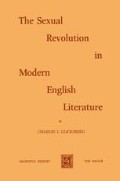Abstract
Early twentieth century fiction owes two of its main directions to Wells’ activity as a pamphleteer and a novelist—the incursion of the theme of sex, and the deliberate extension of the whole field of action of the novel. In A Modern Utopia in 1905 he discussed Free Love and Contraception—then called Neo-Malthusianism.… His novel Ann Veronica in 1909 caused a scandal.… The book was banned by the libraries, and preached against by earnest clergymen, and so advertised into notoriety and influence.1
Access this chapter
Tax calculation will be finalised at checkout
Purchases are for personal use only
Preview
Unable to display preview. Download preview PDF.
References
J. Isaacs, An Assessment of Twentieth Century Literature. London: Secker & Warburg, 1951, p. 22.
Samuel Hynes, The Edwardian Turn of Mind. Princeton: Princeton University Press, 1968, p. 171. The role of women in society came up for heated debate. What was the proper relation between the sexes? “By the end of Edward’s reign many thoughtful people had come to believe that the institutional forms of man-woman relations in England were outmoded and unjust at best and were often immoral and degrading. Attitudes were changing toward marriage and divorce, toward the double standard (which the existing divorce laws made official), and toward irregular sexual behavior.” (Ibid., p. 173.)
Wells and Shaw seem to have much in common. Both were Fabians, though Wells later withdrew from that group. Wells was a planner, a tireless propagandist in behalf of a World State, a formidable rationalist, a staunch believer in the power of science, when properly applied, to save the world from catastrophe. Shaw, too, is Utopian, a fervent Socialist, but he is skeptical of the methods of science and the miraculous benefits science is supposed to yield. If examined in depth, the two men are polar opposites. Shaw, a Puritan, is not interested in contracting the disease of love; the sex instinct does not drive him to sacrifice himself for some physically desirable woman. Wells, on the other hand, is a romantic, a libertarian, strongly sexed, a believer in “free love.” Lovat Dickson reports: “He had recurrences of his vagrant mood—a longing to escape from what he called’ domestic claustrophobia,’ which came on him from time to time, arising, so he thought, from a not fully satisfied sex-life—which he was quite powerless to resist. He had the predatory urge of the highly sexed person, incapable of withstanding a blind attraction, and the attempts to control it were nearly always doomed to failure.” Lovat Dickson, H. G. Wells. New York: Atheneum, 1969, p. 73. 4 H. G. Wells, Experiments in Autobiography. New York: Macmillan, 1934, p. 353.
Ibid., pp. 398-399.
Ibid., p. 400.
See Vincent Brome, H. G. Wells. London and New York: Longmans, Green and Co., 1951.
H. G. Wells, Experiments in Autobiography, p. 395.
“Ann Veronica, when it was written in 1908, was centred on the love-affair he was then having with Amber Reeves, an attractive young Cambridge blue-stocking and a member of the Fabian ‘nursery’.…” Lovat Dickson, H. G. Wells, p. 51.
H. G. Wells, Ann Veronica. New York: The Modem Library, 1909, p. 30.
Ibid., p. 108.
Ibid., p. 150.
Ibid., p. 153.
Ibid., p. 154.
Ibid., p. 183.
Ibid., pp. 185-186.
Ibid., p. 229.
Ibid., pp. 263-264.
Ibid., p. 322.
Ibid., p. 325.
Ibid., p. 327.
Ibid., pp. 347-348.
Ibid., p. 364.
H. G. Wells, First and Last Things. New York and Londen: G. P. Putnam’s Sons, 1908, p. 271.
Rights and permissions
Copyright information
© 1973 Martinus Nijhoff, The Hague, Netherlands
About this chapter
Cite this chapter
Glicksberg, C.I. (1973). H. G. Wells and the New Sexual Morality. In: The Sexual Revolution in Modern English Literature. Springer, Dordrecht. https://doi.org/10.1007/978-94-011-9548-5_3
Download citation
DOI: https://doi.org/10.1007/978-94-011-9548-5_3
Publisher Name: Springer, Dordrecht
Print ISBN: 978-94-011-8712-1
Online ISBN: 978-94-011-9548-5
eBook Packages: Springer Book Archive

